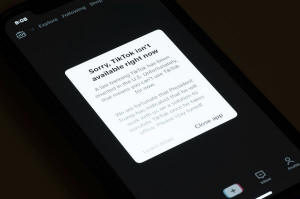TikTok restores service for US users based on Trump's promised executive
order
 Send a link to a friend
Send a link to a friend
 [January 20, 2025] By
HALELUYA HADERO [January 20, 2025] By
HALELUYA HADERO
TikTok restored service to users in the United States on Sunday just
hours after the popular video-sharing platform went dark in response to
a federal ban, which President-elect Donald Trump said he would try to
pause by executive order on his first day in office.
Trump said he planned to issue the order to give TikTok’s China-based
parent company more time to find an approved buyer before the ban takes
full effect. He announced the move on his Truth Social account as
millions of U.S. TikTok users awoke to discover they could no longer
access the TikTok app or platform.
But by Sunday afternoon, a message greeted those who signed on thanking
them — and the president-elect — for their support.
“As a result of President Trump's efforts, TikTok is back in the U.S.!”
the message read.
TikTok said it shut down the platform late Saturday because of a federal
law that required parent company ByteDance to sell its U.S. operation by
Sunday. Google and Apple also removed TikTok from their digital stores.
The law, which passed with wide bipartisan support in April, allows for
steep fines.
While the company that runs TikTok in the U.S. said on X that the steps
Trump outlined Sunday provided “the necessary clarity and assurance to
our service providers that they will face no penalties," the TikTok app
remained remained unavailable for download in Apple and Google’s app
stores.
“It was a brilliant marketing stunt for both TikTok and incoming
president Donald Trump," Jasmine Enberg, an analyst with market research
firm Emarketer, said. “By abruptly shutting off service, TikTok proved
how unpopular the ban was among its users."

Why was TikTok banned? What can Trump do about it?
The law that took effect Sunday required ByteDance to cut ties with the
platform’s U.S. operations due to national security concerns. However,
the statute authorized the sitting president to grant a 90-day extension
if a viable sale was underway.
Although investors made some offers, ByteDance has said it would not
sell. Trump said his order would “extend the period of time before the
law’s prohibitions take effect” and “confirm that there will be no
liability for any company that helped keep TikTok from going dark before
my order.”
It wasn't immediately clear how Trump's promised action would fare from
a legal standpoint since the U.S. Supreme Court unanimously upheld the
ban on Friday and the statute came into force the day before Trump's
return to the White House. Rep. Mike Gallagher, a Republican from
Wisconsin and the bill's author, said on Fox News Sunday that “there is
no extension” for TikTok.
“Let me tell you, as the person who wrote the bill, the extension was
within the 270-day window, which closed at 12:01 a.m. this morning,” he
said, adding that only if the president certifies there are “legally
binding documents” showing a divestiture is on the way would there be an
extension.
“I think Trump can at least make an argument that the language is meant
to cover any president,” University of Richmond law professor Carl
Tobias said.
Some lawmakers who voted for the sale-or-ban law, including some of
Trump's fellow Republicans, remain in favor of it. Sen. Tom Cotton of
Arkansas warned companies Sunday not to provide TikTok with technical
support.
“Any company that hosts, distributes, services, or otherwise facilitates
communist-controlled TikTok could face hundreds of billions of dollars
of ruinous liability under the law,” Cotton wrote on X. “Think about
it.”
Constitutional and business law attorney Kirk McGill said he thinks
Trump lacks the legal authority to suspend the ban but it’s unlikely the
question would reach a court in the time it might take TikTok to find a
buyer.
It’s also unlikely that Apple or Google will face legal consequences if
they move forward with Trump’s demands, given that his administration
would have to initiate any prosecutions, McGill said.
“In the next week or two, before the courts have the chance to do
anything, this is certainly going to be a political fight, not a legal
one,” McGill said.

[to top of second column] |

A message reading "Sorry, TikTok isn't available right now" is
displayed from the TikTok app on a cell phone screen on Saturday,
Jan. 18, 2025, in Los Angeles. (AP Photo/Andy Bao)
 TikTok shuts off — but only
temporarily?
The on-and-off availability of TikTok came after the Supreme Court
ruled that the risk to national security posed by TikTok’s ties to
China outweighed concerns about limiting speech by the app or its
millions of U.S. users.
When TikTok users in the U.S. tried to watch or post videos on the
platform as of Saturday night, they saw a pop-up message under the
headline, “Sorry, TikTok isn’t available right now.”
“A law banning TikTok has been enacted in the U.S.,” the message
said. “Unfortunately that means you can’t use TikTok for now.”
The app was removed late Saturday from prominent app stores and
remained so as of Sunday afternoon. Apple told customers it also
took down other apps developed by ByteDance. They included Lemon8,
which some influencers had promoted as a TikTok alternative, the
popular video editing app CapCut and photo editor Hypic.
“Apple is obligated to follow the laws in the jurisdictions where it
operates,” the company said.
Google declined to comment. Apple did not immediately respond to a
message seeking comment on the day's developments.
Experts had said the law as written did not require TikTok to take
down its platform, only for app stores to remove it. Current users
expected to continue to have access to videos until a lack of
updates caused the app to stop working.
After TikTok was back online Sunday, content creator Tiffany Watson,
20, said she was “pretty hopeful” it would stay up. At the same
time, Watson said her dedication “solely” to the platform declined
during the months the threat of a ban loomed.
“Overall, I hope that creators will succeed and find community in
spite of the unpredictability of TikTok," she said.
Will the ban's timing help TikTok?
Trump's plan to spare TikTok on his first day in office reflected
the ban's coincidental timing and the unusual mix of political
considerations surrounding a social media platform that first gained
popularity with often silly videos featuring dances and music clips.
During his first presidential term, Trump in 2020 issued executive
orders banning dealings with ByteDance and the owners of the Chinese
messaging app WeChat, moves that courts subsequently blocked.
Trump has since credited TikTok with helping him win support from
young voters in last year's presidential election. TikTok CEO Shou
Chew is expected to attend Trump’s inauguration with a prime seating
location.

Trump's choice for national security adviser, Michael Waltz, told
CBS News on Sunday that the president-elect discussed TikTok during
a weekend call with Chinese President Xi Jinping “and they agreed to
work together on this.”
The Biden administration has also stressed in recent days that it
did not intend to implement or enforce the ban before Trump takes
office on Monday.
Who are possible buyers of TikTok?
ByteDance has publicly insisted it would not sell TikTok, and no
likely buyer has emerged.
On Saturday, artificial intelligence startup Perplexity AI submitted
a proposal to ByteDance to create a new entity that merges
Perplexity with TikTok's U.S. business, according to a person
familiar with the matter.
Perplexity is not asking to purchase the ByteDance algorithm that
feeds TikTok user’s videos based on their interests.
In Washington, lawmakers and administration officials have long
warned that the algorithm is vulnerable to manipulation by China. To
date, the U.S. has not publicly provided evidence of TikTok
providing user data to Chinese authorities or tinkering with the
algorithm to benefit Chinese interests.
Another unknown is whether Trump will remain a TikTok fan.
“He’s flip-flopped on his stance toward TikTok before, and there’s
no guarantee he won’t do so again,” EMarketer's Enberg said.
___
Kanis Leung in Hong Kong and Charlotte Kramon in Atlanta, Nadia
Lathan in Austin, Texas, and Barbara Ortutay in Oakland, California,
contributed to this story.
All contents © copyright 2025 Associated Press. All rights reserved |